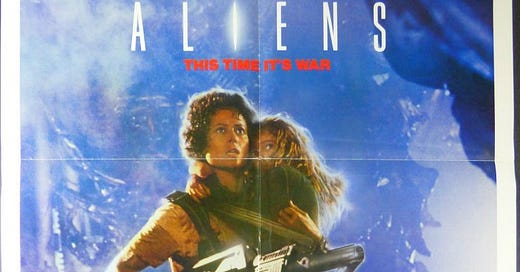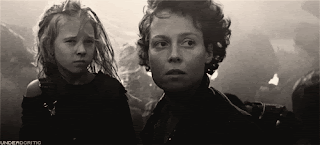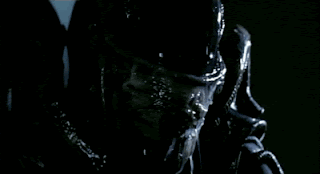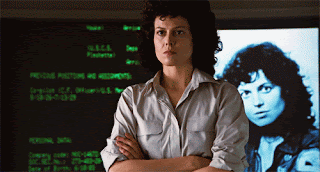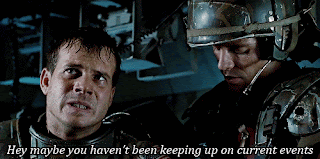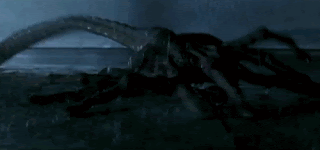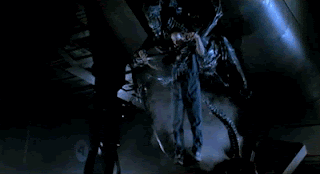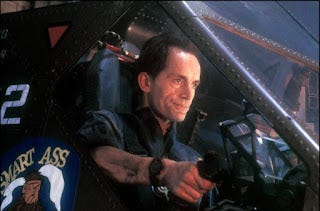Screenwriting for Beginners, as Told Through The Movie Aliens!
The following is a kind of overly simplified explanation as to how your basic movie script story is broken down, that I originally wrote to someone, who asked my advice on the subject. There is of course a lot to add to this conversation, I’m going to be very brief, but if you've never written a script before and want to try, this may be a good jumping-off point. I hope it helps.
Here it is:
So, telling a good story is a many-layered thing, and like learning to draw or play an instrument, you have to suck at it before you can get good. I don't even know if I'm that good, but I think I know enough to keep things entertaining.
The first thing to understand about most stories is that they're broken down into three acts. Sometimes more, sometimes less, but three is the standard and you should stick with that number until you understand why. My upcoming film, The Quantum Terror is in three acts. Each act is like an episode with a cliffhanger, where all the ideas you have introduced at the beginning, come to a head at the end of the act.
I'll be using Aliens as an example, just in case you didn’t read the headline. If you’ve never seen it then this isn’t going to be of any use to you because I’m not going to take time to describe characters or plot in detail. I’m just going to point to them as examples. Go familiarize yourself with the first two movies (pretend they stopped with the second one) then come back here and we’ll continue.
In act one we are reintroduced to Ripley and what her life and attitude are like after the first movie. We see how people interact with her when she tries to tell them her experience, how her trauma has made her feel scared and alone, and then we see how she is treated when people who have a stake in the situation start to believe that she may be telling the truth.
She and a platoon of space marines who think they’ve got everything under control, go to the planet to check things out.
Then they find Newt who foreshadows how bad things can really get, but the marines think, "We've got this." Ripley however, recognizes her own trama in the child as well as the ghost of the daughter (if you watched the director’s cut) she lost in the fifty-seven years she was asleep. Soon they're in the hive and most of their party gets wiped out. Ripley saves what is left of them in a huge climatic rescue and boom, the first act is done. Both characters and the audience understand the full scope of the situation.
The second act opens with them discussing just how bad the problem is, far worse than they imagined, and asking themselves "How are we going to handle this?" That's how every second act starts. The characters are forced to rethink their situation in some way and come up with a new plan to deal with it.
This act is all about forming a new approach to the problem, and it usually goes pretty well for a bit, even with new problems popping up along the way, until BAM!!!! Everything starts turning to crap, unraveling, until everything is left in ruins, leaving our characters in a “darkest hour”. Their ride back to the ship crashes! They need to call the other ship down remotely because the planet is going to explode soon. The hardware to do that is trashed? Okay, Bishop will have to go out there and do it manually. Stay safe and bolted up in the compound. Wait a minute, Burk is trying to infect Ripley and Newt with a face-hugger. Now, Aliens have found a way in. The ride is here, but now everyone is dead and the Aliens just grabbed Newt and took her back to their hive to make more alien babies. End of second act!
Act three! Now everything has fallen apart and things are even worse. The planet is about to blow up. The one solder that could help is out of commission, and Ripley has to go into the belly of the beast to get back the one thing she cares about. Again, Ripley has to rethink everything to get through this. Things get worse. The tracking device on Newt gets dropped. They run into the Alien Queen.
Oh no, the Queen got on the ship once they escaped and tore Bishop in half.
Ripley has had enough and here comes the big climactic showdown over the daughter that Ripley lost, but has a chance to redeem that loss. Ripley wins. End of act three. End of movie.
Within these acts are highs and lows, like a roller coaster taking you up and down. Stay high or low for too long and the story gets boring. But what is the story? All of the stuff I wrote above is just the stuff that happens. That's not story! Okay, so this is the most important thing I'll tell you. Here it is. The story is how each character reacts to the stuff happening, and how it changes them. We have the story of Ripley, who is broken but has to pull herself together to overcome her trauma. She goes from telling people, “I don’t want to go back out there, I’ll die.” to “You can’t stop me from going into the lair of the best to rescue Newt, and I’m willing to die to do it.” That’s the most boiled-down explanation of her arc as a character.
There's the story of Bishop, who is silently seeking Ripley's approval by overcoming the prejudice that her previous experience with an android has instilled in her.
There's the story of Hudson, who is a punk-ass and thinks he's invincible but turns coward and freaks out when faced with something tougher than he is. In the end, though, he redeems himself when he saves Newt from the face-hugger and then later goes down fighting, holding off the Aliens as the rest of his fellows escape. Burk has a story. Hicks has a story. Every last one of them has a story, and each one is reacting to what is happening and also reacting to how they're interacting which each other, as events unfold. Each one of these arcs has a beginning a middle and an end, no matter how things turn out for them. Each one either learns something and grows, or meets their end because they refused to.
My favorite example is the line, "You always were an asshole, Gorman." It really sums up what Vasques has been internally expressing all along. Watch how she interacts with him, up until that moment. She doesn't respect him, not from the start but when his decisions get her partner killed and make everything go from bad to worse, it confirms her attitude towards him, building wave after wave of resentment through the runtime of the movie. When she gets burned by acid and trapped by the aliens in the air ducts, Gorman redeems himself to her by going back to save her and making the choice to sacrifice himself and die with her, when he realizes that they’re both doomed. Rather than leave her to face her fate alone he makes the decision that she would have made for any of her fellow soldiers. In that last moment, she sees his bravery, sees that he is actually a true comrade in arms, and he is repentant for his failers, in her eyes. I don’t know if she forgives him but she does respect him. This is shown brilliantly, not by cheap dialog but by her clasping her hand over his, as he uncorks the grenade that will spare them a much more horrible death to come.
There's really a lot going on in that movie. When I hear people say that the marines in Aliens are one-dimensional, it really tells me that a lot of people don’t know what actual character development is. Within minutes of meeting each of them, you learn so much about them that they feel instantly familiar as if you’ve known them a lifetime. That’s why they endure where the characters in later sequels feel so ham-fisted and forgettable. (Sorry, if you disagree and like those characters but objectively, it’s true, they’re inferior.)
Is that everything you need to know? Is this the only way to tell a story? Hardly. Becoming a good writer takes decades of practice and intense attention to both the big picture and minute details of your story. You also need to have stories you really want to tell. Like I said before, these are just some of the foundational things you can start with as you build your own film script, comic book, novel, or play.
Happy writing.
If you’d like to know more about my feelings regarding the Alien franchise, you can watch a series of YouTube videos I’ve done on the subject by clicking HERE.
Thanks for reading, everybody. This is actually something I wrote years ago on the now-defunct blog for The Quantum Terror. I did some re-editing and caught some typos but thought the information was still pretty good. I hope you enjoyed it and found it useful.
Be sure to follow me on my other social media...
Substack:
Facebook: https://www.facebook.com/ChristopherMoonlightProductions
Instagram: https://www.instagram.com/christophermoonlight
MeWe: https://mewe.com/group/618fd8faf6f4df6686383749Reddit: https://www.reddit.com/user/ChristopherMoonlight
Bitchute: https://www.bitchute.com/channel/7Xtj2DvclqeN/
Minds: https://www.minds.com/Christopher_Moonlight/
Rumble: https://rumble.com/c/c-966257

